Unsolicited Opinions, Part 1
where I pontificate on Substack, writing, and the numerous humiliations of both
In 2014, I was shit upon twice by the general public.
I first experienced being heckled online after the now defunct art magazine Modern Painters published an op-ed piece I’d written, after having been encouraged by their editor-in-chief to really express my opinion. The piece cannot be found online—which is likely for the best—but was titled “The Quotational Pandemic”, and exists in the May 2014 issue, possibly in the home of a curator near you.
What I wrote about isn’t that important. I felt certain trends in painting were lazy and derivative, and said so. As mentioned, the editor-in-chief encouraged me to be honest, and to not pull my punches. I did as as I was told, and I named names. I said artist X was ripping off artist Y, and that artist Z should be ashamed of themselves. While writing I shared my opinions with artists I knew and respected, and they agreed with me, as did that unnamed editor-in-chief, who said my piece would be the first instalment of a new column that would appear front-of-book in each issue, where artists and other art professionals made bold assertions, typically of the sort that everyone thought but dared not say.
Then the magazine was published and made the rounds. One of the artists I’d named took to Facebook, seemingly accompanied by a bottle of wine. They ripped me a new one. I was called—bizarrely if you know me—a “Christian wackjob” and “a warmongering neocon” who “makes second-rate versions of Luc Tuymans” paintings. I’d simply implied that they were imitating Henri Matisse. How war and Jesus entered into things, I’ll never know. I felt most galled by the suggestion that I painted like Luc Tuymans, an artist I’d long disliked, and who I’d also criticized in print just months earlier.
Needless to say my piece was not the first, but instead the last, instalment of an op-ed column where artists and curators told the truth about their industry. I learned why people ‘dare not say’ things. Intelligence. Self-preservation. But I didn’t learn well enough.
The second time I was pummelled by the downward facing thumb button, I’d simply been trying to make rent. I was writing regularly for an art news website, also now defunct. For each piece I wrote, I made fifty dollars. This was ten years ago. If you’re curious what writers get paid, I’ll tell you that rates have hardly changed. I’d just moved back to Toronto after having lived in Vancouver for eleven years. In Vancouver, I noticed that artists often bitched about Toronto, that they actually hated Toronto, and the artists who lived there. In Toronto, I never once heard anyone mention Vancouver, never mind the artists who lived there. There was, I saw, a rivalry that only one side was aware of. I didn’t understand it. Vancouver was home to a handful of artists who were known globally. Toronto, not so much. Why wasn’t it the other way around, with Toronto bitching about Vancouver? “Irrelevant Rivalry” was the title of the piece I wrote. When it was published, my editor had added the subtitle “Why Are There No Canadian Art Stars?” That wasn’t my title, or my question. There were also numerous errors that were not there when I filed the piece with my editor. With a subtitle like that, Canadian art professionals were liable to get mad. And they did. They yelled at me on Facebook, where all yelling took place in 2014. They said “artist X is represented by Gagosian!” and “artist Y was included in the Venice Biennale!” That artist X and artist Y were both relatively unknown in the larger art world—thus proving the point implied by my editor’s subtitle, which again was not my point—did not matter. I had betrayed my nation. I began to have nightmares where I was pelted with donuts and beaten with hockey sticks and hard, dry back bacon.
I quit Facebook. I made a vow that I’d never express my opinion in public again. I’ve mostly kept that vow. But sometimes you just feel so moved…
None of the screenshots I’ve posted here are from my own Substack, or from the Substacks of anyone I follow. They’re posts I encountered over the last week, after opening the app on my phone and, to use a loathsome phrase, “scrolling the feed,” which I hope to never do again.
I’ve cropped out the name of the account in all but a few of these screenshots, which hopefully means that I’ve learned from my mistakes.
If you open Substack on your phone right now, you’ll be met with countless posts resembling the one above, and the ones that will follow. I don’t understand why I’m being shown these posts. I don’t subscribe to accounts like these, I’m not active on the app, and I’m not searching for tips on how to be a writer. If the posts in my feed are to be believed, Substack has a two-fold purpose; to amass subscribers—then convert them to paid subscribers—and, not to become a writer, but to convince oneself that one is a writer.
The first post, with 575 likes, is from an account with 23 subscribers. This isn’t a dig. You can be a writer with 0 subscribers. Don DeLillo is, as is Margaret Atwood. I’d love to be a writer who isn’t forced to hustle, but like countless others with less talent than DeLillo and Atwood, I’ve been swept up in the gruesome tsunami of unceasing self-promotion. The post is popular because it’s comforting. But it’s also meaningless, and could easily be printed on a throw pillow at Bed Bath & Beyond. This morning I saw over a dozen posts asserting that the job of a writer is to be “messy” and “unhinged.” I also saw a very popular post from an account with a few hundred subscribers, which told me that if I “get hung up on critiquing structure” then I “don’t care about literature.” I didn’t know I had it wrong all this time. I thought being concerned about structure meant that I did care about literature. Live and learn.
Posts concerned with convincing others that the job of a writer is to be messy—to be unhinged, to be unconcerned with structure, spelling or grammar—read like roundabout ways of asking for reassurance that it’s okay that your writing is messy, and riddled with spelling and grammatical errors.
And it is okay. You can be a writer. You can be anything you like. But once you ask others to become your readers, understand that they sometimes judge your work based on your craft, and might not just take you at your word that you have the best intentions, because you identify as a writer, which is often framed in posts on Substack as the noblest of professions, akin to being an essential worker.
The screenshot in the middle, with 2.2 thousand likes, tell us that the writer—who is “still not viral, still not famous”—recently discovered that “apparently, consistency is the key, even when the door refuses to open.” For one, if you can’t unlock a door with a key, chances are you’ve got the wrong key, or you’re fucking with the wrong door. Maybe you’re not supposed to enter that locked room. Maybe it’s not for you. But the idea that consistency is apparently important, that part makes me scratch my head. If I’m about to have a triple bypass, I’d like to believe that the surgeon performs that operation on a regular basis, not just every few months when he’s got time on his hands. Yes, consistency, in anything one strives to be good at, is important, and not just apparently, but obviously.
If eighty percent of the conversation on my feed is about asserting exactly what a writer is, and about Substack itself—how to ‘monetize your content’, how to ‘convert subscribers to paid’ and how to ‘go viral’—the other twenty percent is about AI, about the apparent threat posed by AI, and about how ‘AI slop’ is heartless, unthinking, and the enemy of writing, and writers. Some people claim they can spot AI in a heartbeat, while others claim it’s impossible to spot. Some say 39% of all content on Substack is AI, while others say it’s higher. Everyone seems to agree that it’s not good, and they congratulate others for sharing their opinion, sounding like comrades in an important battle both economical and moral. Personally, I don’t have an opinion. I know that I write using just my brain and fingers, but I don’t know that that makes me better than someone who employs ChatGPT. I also don’t care. As an artist, I’ve witnessed a similar communal sanctimony in regards to AI on Instagram. The only thing I do know is that the public aggrievedness is a bad look. How dare they! That’s not art/writing! Are you sure? Me, I’m not so smart that I feel confident defining what both art and writing are. I just do my best to make good work. The self-righteous indignation regarding AI looks a lot like a charcoal grill yelling at a microwave, or like a cold breeze giving the finger to an air conditioner, but that’s just me.
But…the poster of the first of the two screenshots above—who has a name similar to Letters You Never Sent1—says that if those five strangers who’ve subscribed to their Substack showed up to their house asking about their writing, they ‘d “shit a brick.” I mean, me too. If any of the people who follow me on Substack or Instagram showed up to my house uninvited, I’d really be upset. For one, how do they know where I live? Two, what do they want?
I spent maybe three real hours this week looking at posts on ‘my feed’ on Substack. All posted through the ‘Notes’ function. I saw variations on this post over a dozen times. Each time, '“shit bricks” was used. Of course, the idea that strangers might be interested in our thoughts as writers and artists is beautiful, and has real meaning. I know it means a lot to me when someone I’ve never met tells me they like my writing or artwork. It makes me feel less alone in the world, and if I’m able to help anyone feel less alone themselves, that’s lovely. So in theory, I support the sentiment in this post, but having seen it over a dozen times, posted by different apparent writers, I don’t believe it’s genuine. Whether generated by AI or simply seen elsewhere and reused, it’s just another effort to ‘monetize content’, ‘convert subscribers to paid,’ and ‘go viral’, so therefore meaningless, and mercenary.
The second screenshot, from Arbitrate with Saloni, is another AI offender, which I saw repeated dozens and dozens of times during the three hours I was waterboarded by ‘the feed’. Again, at first glance, it appears to express a desire to connect, when in fact it’s a desire to expand and dominate. It’s the equivalent to the old Instagram ‘follow 4 follow’ line, and hurts no one but sincerity as a concept.
What I haven’t said but meant to is that the vibe is a striving one, and I get it. It’s fucking rough out there. Even if the world weren’t especially dark, and regular people weren’t paid like shit while a select few are obscenely wealthy, the idea of making money while in bed writing about yourself is clearly attractive. If faced with the option to work at Costco or work from home writing about my interests, I’d choose the latter every time. But I’ve never been asked to choose, so I do the equivalent of work at Costco. I find it challenging to parse the difference between people who are as financially frustrated as I am—and see Substack as a possible way to pay their bills and afford health insurance—and people who just think they’re super fucking interesting, that writing should be ‘messy’ and that craft—structure, grammar, spelling etc—is an afterthought, something one shouldn’t be handicapped by in the pursuit of sacred self-expression. I have empathy—so much empathy—for people forced to view themselves as brands, assailed at all times by advertising, cut to pieces by subscription fees and six dollar coffees, who have been told by manipulative, pernicious corporations—who’ve intentionally designed addictive, soul and culture-depleting apps—that they can get rich quick by turning themselves into products, so long as the Mother Corporation gets a cut of the profit. I have empathy in large part because I’m one of those people. But I wasn’t always. I used to just be an artist with a dial-up modem. I sent my paintings to galleries where they were photographed, and I was given slides of the work. My show went up, my show came down. It did not exist online. I was not forced to produce content daily, and to compete with millions of other artists in real time, in public. I made ten, maybe twelve paintings a year, and I was able to live in relative comfort. Today I am an artist, a writer, a t-shirt designer, an editor, someone with a Substack, someone with a ‘good Instagram’ and someone who just can’t catch their breath.
Everyone trying to figure out how to make Substack work for them, how to ‘monetize’ and ‘convert subscribers to paid’ remind me of people who think they’ve got a system for blackjack, or poker. The dream of paying your rent by posting stories about your life is the dream of breaking the casino. The vibe here reminds me of how it must have felt during the Gold Rush. Everyone’s got a hand axe, and they’re inside the landscape, buried beneath which are fist-sized chunks of pure gold. Everyone’s got an angle, everyone knows what a real miner is, and what a fake miner looks like. And everyone is enamoured of the gold, but not because it’s beautiful; because it’s valuable. During those three hours I spent on the feed, I saw very few posts about writing. There was no mention of Herman Melville or Jane Austen, and fuck all posts were about how to write a good sentence. How to write a sentence that will go viral? Those I saw a lot.
When I wrote that piece for Modern Painters I was being judgemental, and part of me felt holier than thou. So maybe it was right that people shit on me. This time I’m not being judgemental, and I don’t feel better than anyone. Not at all. I understand why people want they want. I want it too. I’m just not convinced that what I want is good for me, or for anyone else. The one thing I kept thinking when I saw posts about how to ‘convert subscribers to paid’ was that I find that part so uncomfortable. I’m no big shot writer, but I’m not brand new. I’ve written for fancy places, and I wrote a fairly popular book. But the idea of asking people to give me seven dollars a month to read what I write feels very, very uncomfortable, and I struggle with it all the time. But that’s probably an issue for my therapist, and has nothing to do with Substack, writing, or anyone else.
This is overly long, only superficially edited, but well-intentioned. This is messy, so maybe I’m a real writer.
Winking face emoji.
Letters You Will Never Send, is a variation on another phrase I saw countless times during my three hour journey into ‘the feed’. In posts where I was being told what a ‘real writer’ is, I learned that a real writer writes a story the way they would write an ‘unsent letter’. That is, fearlessly, without concern for the consequences. ‘Full of heart’ , ‘messy’, bullshit like this.






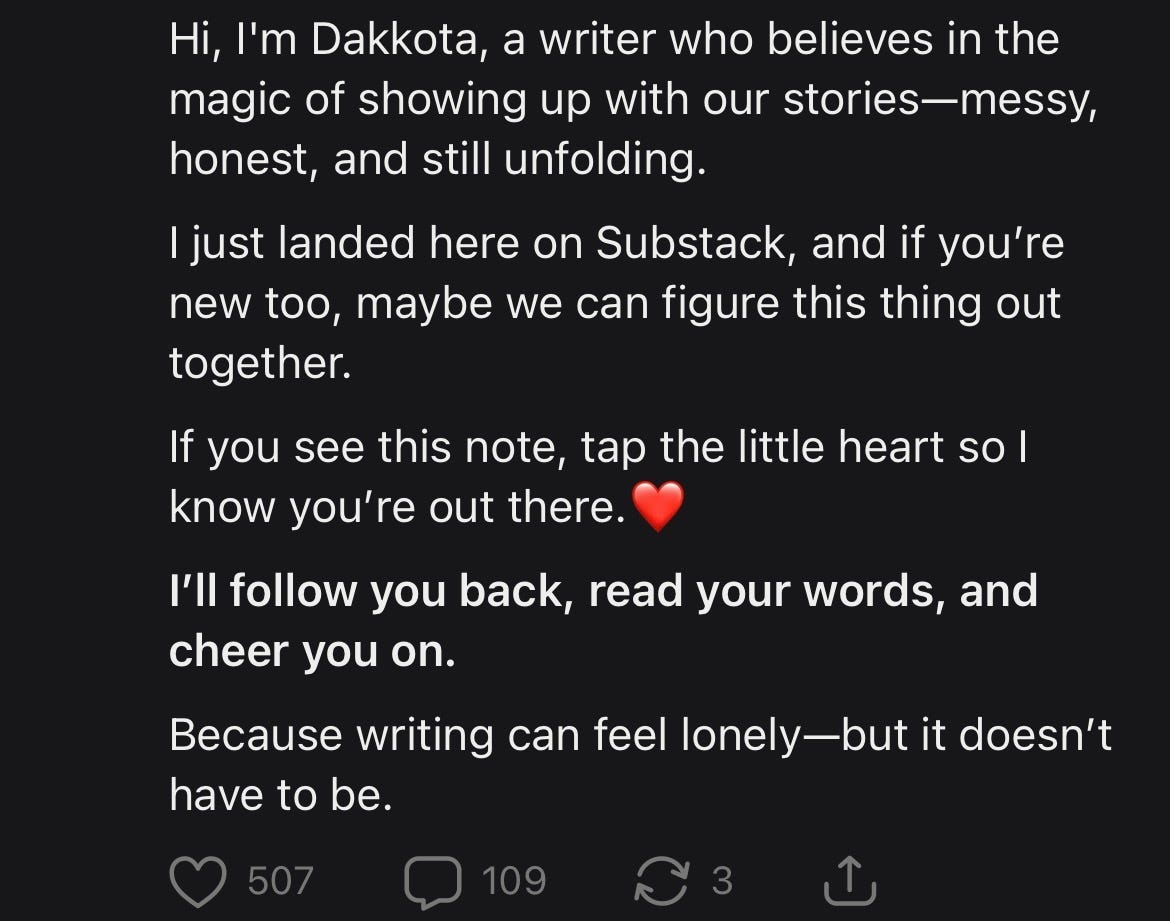
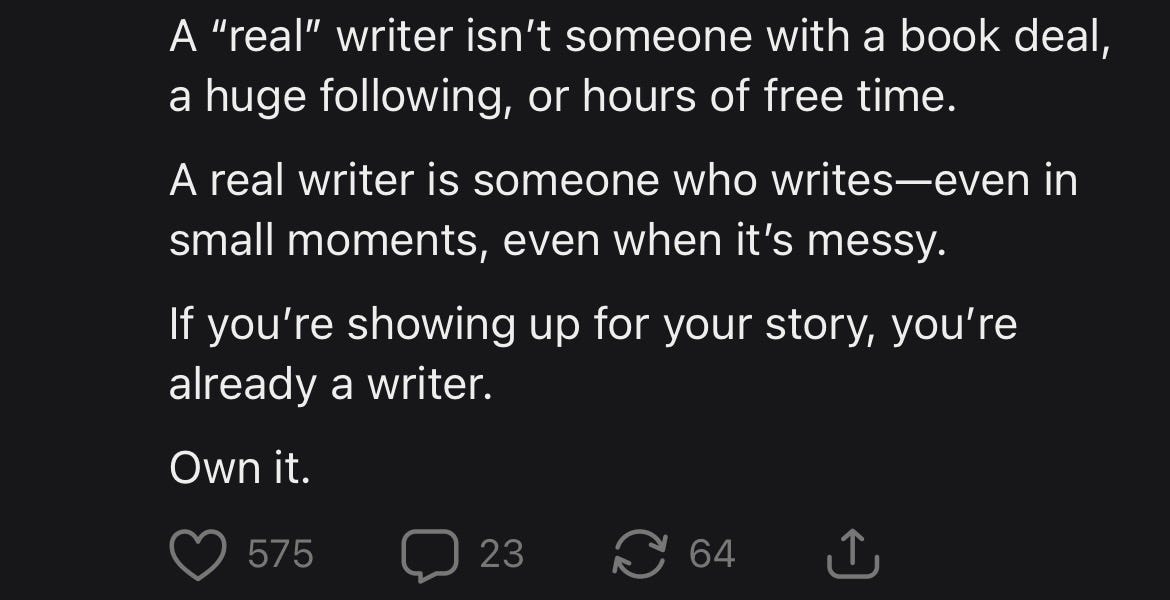
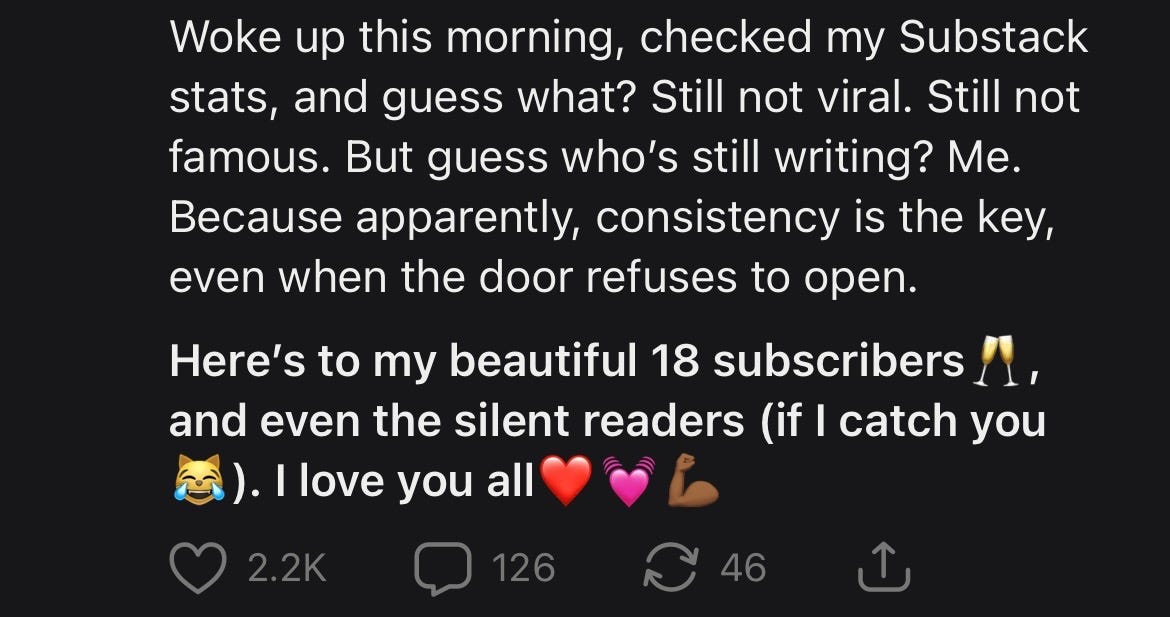

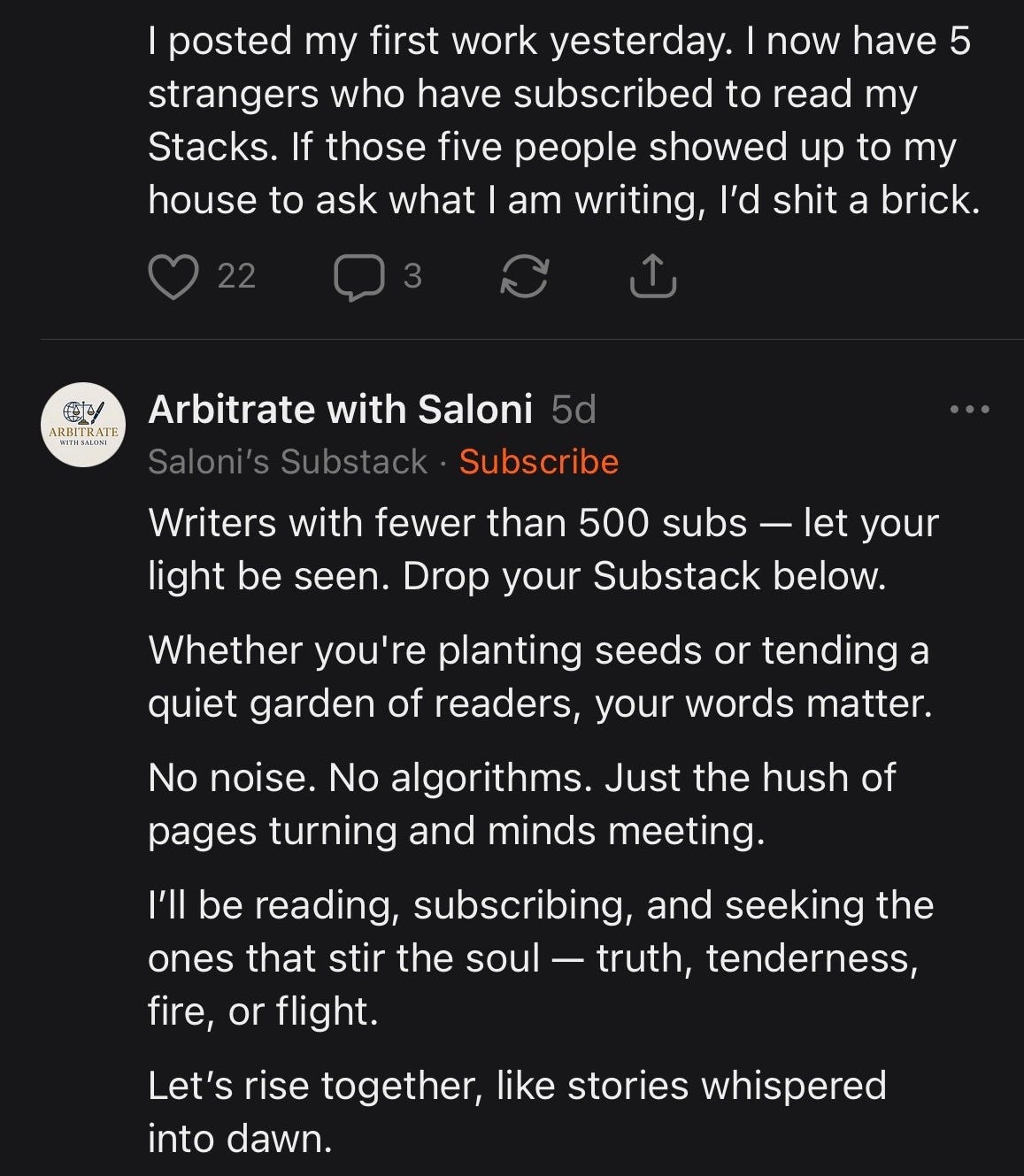
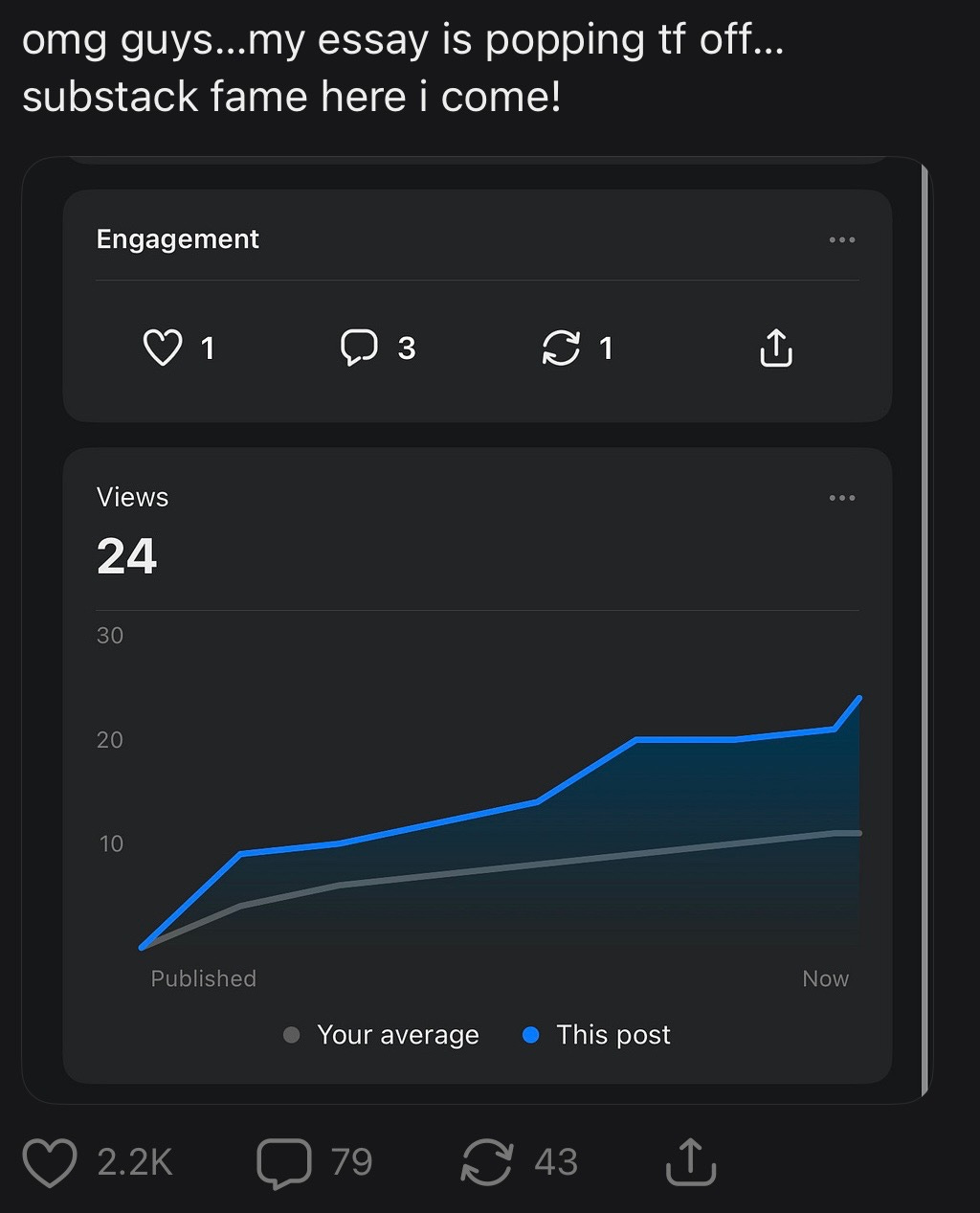
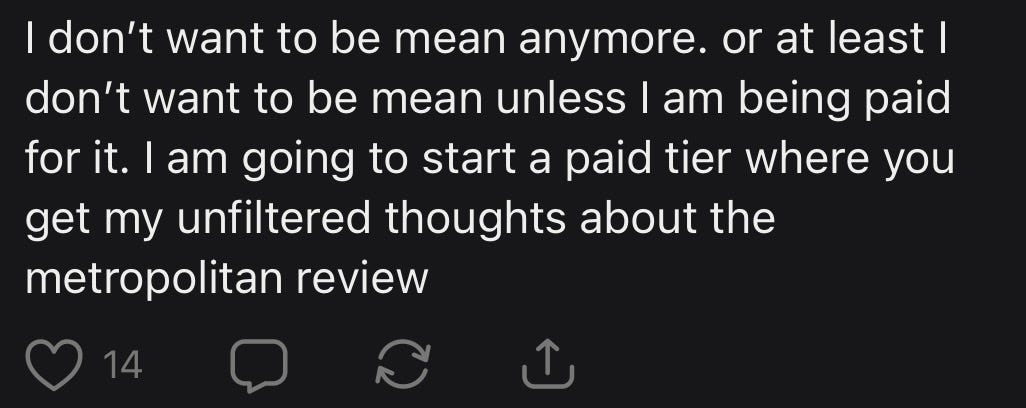

Christian Big Foot Wackjob.
I’m running around hustling most of the time lately without allowing myself to read your emails but briefly. This one today, I couldn’t put down.